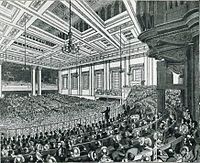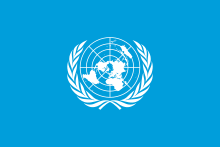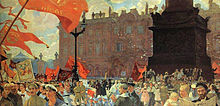Internationalism (politics)
In 19th-century Great Britain, there was a liberal internationalist strand of political thought epitomized by Richard Cobden and John Bright.
[4]Cobden believed that Free Trade would pacify the world by interdependence, an idea also expressed by Adam Smith in his The Wealth of Nations and common to many liberals of the time.
Other international organizations included the Inter-Parliamentary Union, established in 1889 by Frédéric Passy from France and William Randal Cremer from the United Kingdom, and the League of Nations, which was formed after World War I.
The former was envisioned as a permanent forum for political multilateral negotiations, while the latter was an attempt to solve the world's security problems through international arbitration and dialogue.
Sir Norman Angell in his work The Great Illusion (1910) claimed that the world was united by trade, finance, industry and communications and that therefore nationalism was an anachronism and that war would not profit anyone involved but would only result in destruction.
Lord Lothian was an internationalist and an imperialist who in December 1914 looked forward to "the voluntary federation of the free civilised nations which will eventually exorcise the spectre of competitive armaments and give lasting peace to mankind.
Internationalists also advocate the presence of international organizations, such as the United Nations, and often support a stronger form of a world government.
Contributors to the current version of internationalism include Albert Einstein, who was a socialist and believed in a world government, and classified the follies of nationalism as "an infantile sickness".
Socialist internationalism is anti-imperialist, and therefore supports the liberation of peoples from all forms of colonialism and foreign domination, and the right of nations to self-determination.
The Inaugural Address of the First International, written by Marx in October 1864 and distributed as a pamphlet, contained calls for international cooperation between working people, and condemnations of the imperialist policies of national aggression undertaken by the governments of Europe: If the emancipation of the working classes requires their fraternal concurrence, how are they to fulfill that great mission with a foreign policy in pursuit of criminal designs, playing upon national prejudices, and squandering in piratical wars the people's blood and treasure?
Ostensibly committed to peace and anti-imperialism, the International Socialist Congress held its final meeting in Basel, Switzerland in 1912, in anticipation of the outbreak of World War I.
The conference was unable to reach agreement on all points, but ultimately was able to publish the Zimmerwald Manifesto, which was drafted by Leon Trotsky.
[20] The perceived betrayal of the social-democrats and the organization of the Zimmerwald Left would ultimately set the stage for the emergence of the world's first modern communist parties and the formation of the Third International in 1919.
A variety of still active left-wing political organizations claim to be the contemporary successors of Trotsky's original Fourth International.
The 4th World Congress of the Communist International established the legal framework for internationalist collaboration and the foundation of agricultural and industrial communes within the USSR.
[24] The call for internationalist solidarity attracted settlers from countries such as Austria, Czechoslovakia, Denmark, Estonia, Germany, Italy, Sweden, Uruguay and the United States.
[27] By 1932, the Frunze-based cooperative comprised members from 14 different ethnicities who had developed an organic pathwork working language referred to as "spontánne esperanto".
[28] Being a product of the New Economic Policy, after Stalin's Great Break most internationalist communes operating in the USSR were either shut down or collectivized.
[32] As he puts it, the New International should be "without status ... without coordination, without party, without country, without national community, without co-citizenship, without common belonging to a class."
[33] Paradise Lost, in particular, shows "the possibility of political actions oriented toward international justice founded outside the aristocratic order.




